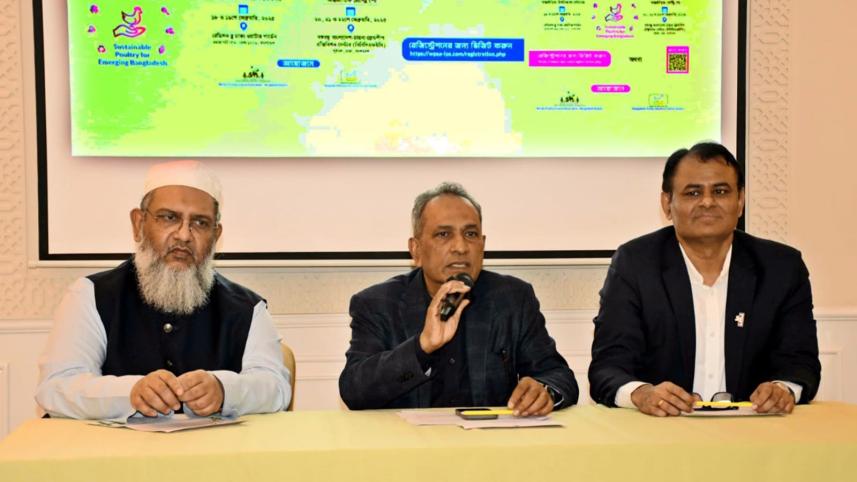Goal to double production: Poultry entrepreneurs share sector insights

With the population steadily increasing and arable land shrinking, Bangladesh faces a critical challenge: doubling the production of eggs, milk, and poultry to meet the nutritional demands of an estimated 220 million people by 2050.
This target was highlighted during an interactive meeting between senior journalists and leaders of the poultry industry in Dhaka.
Moshiur Rahman, president of the World's Poultry Science Association-Bangladesh Branch (WPSA-BB), emphasised the need for integrating modern knowledge and technology to achieve this goal. He announced the upcoming "13th International Poultry Seminar", scheduled for February 18-19, 2025, at Radisson Blu Dhaka Water Garden, and the "13th International Poultry Show", set for February 20-22, 2025, at the Bangladesh-China Friendship Exhibition Center in Purbachal.
"Bangladesh currently produces around 45 million eggs daily, 20 million day-old chicks weekly, and 7.5 to 8 million metric tons of feed annually. These figures, unimaginable three decades ago, need to double to ensure annual per capita availability of 208 eggs, 300ml of milk daily, and 160 grams of meat daily by 2041," Moshiur Rahman said. He underscored the importance of empowering poultry farmers with modern technology and knowledge to meet these targets.
Dr. Biplob Kumar Pramanik, General Secretary of WPSA-BB, stressed the need for safe and hygienic food, noting that making eggs and poultry meat affordable remains a priority for the middle-income population.
Shamsul Arefin Khaled, President of the Bangladesh Poultry Industries Central Council (BPICC), presented a paper titled "Sustainable Development of the Poultry Industry in Bangladesh."
He noted that the poultry industry has faced stagnation and volatility from 2021 to 2024, with periods of production decline and price fluctuations. Despite producing some of the world's cheapest animal protein, the sector continues to grapple with the global challenge of food inflation.
Khaled cited examples of skyrocketing egg prices in the US and India, comparing them to Bangladesh's efforts to maintain affordability despite economic pressures. He called for market stabilization, increased production, and a focus on environmental sustainability to ensure long-term growth.
Senior journalists acknowledged the sector's challenges, highlighting the lack of reliable data and calling for enhanced collaboration between the media, government, and industry stakeholders. They stressed the need for actionable plans to address price fluctuations and ensure food security for lower- and middle-income groups.
they also urged transparency in information sharing, with some advocating for in-depth reporting to clarify industry challenges and foster trust among stakeholders.
The session was moderated by Dr. Bishwajit Roy, Member Secretary of the Media Sub-Committee for the 13th International Poultry Show and Seminar.
As Bangladesh moves toward achieving its ambitious targets, the collaboration between industry leaders, policymakers, and the media will play a pivotal role in ensuring the sector's sustainability and resilience.
 For all latest news, follow The Daily Star's Google News channel.
For all latest news, follow The Daily Star's Google News channel.